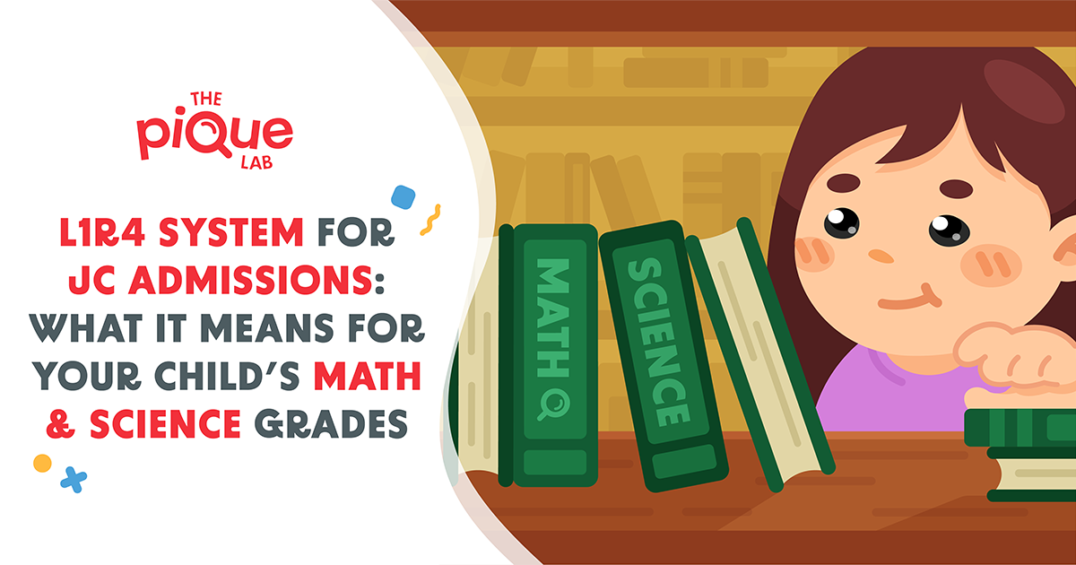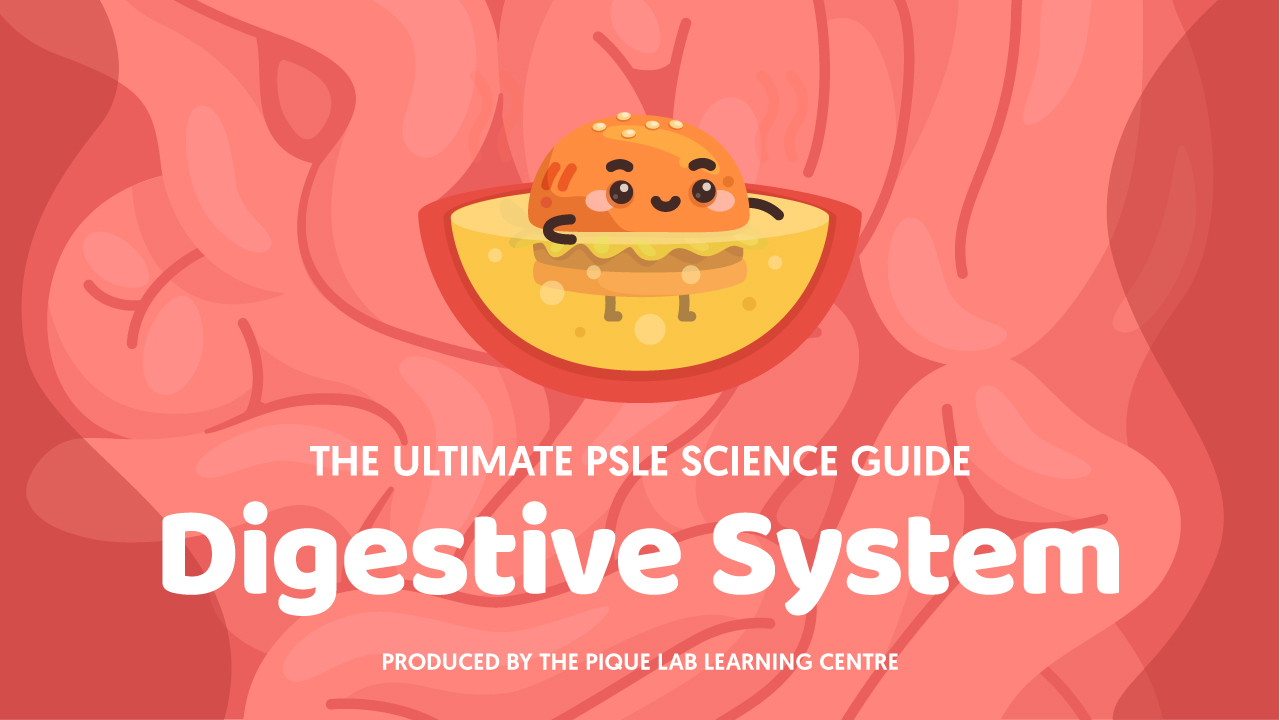Hi Mummies and Daddies!
From the 2028 Joint Admissions Exercise (2028 JAE) onwards, your child and other students entering Junior College (JC) will be assessed under a new system: L1R4.
This marks a significant shift from the long-standing L1R5 system that MOE has been using for decades!
In this blog post, we aim to provide you with a comprehensive overview of the L1R4 system, who’s affected, what subjects are counted and what this actually means for your child’s grades (including Math and Science).
We hope this blog post will serve as a valuable resource to help you and your child navigate this new change with confidence! Let’s dive in:
So Is Your Child Affected By The New L1R4 System?
❌ Secondary 3 and 4 Students in 2025
Students in Secondary 3 and Secondary 4 in 2025 will still be using the traditional L1R5 system and will not be affected by the new L1R4 system.
✅ Secondary 2 Students in 2025
Students in Secondary 2 in 2025 will be the first batch to be assessed using the new L1R4 system when they:
- Sit for the new Singapore-Cambridge Secondary Education Certificate (SEC) exams (Previously O-levels) in 2027 and
- Apply to JC in 2028
✅ Secondary 1 Students in 2025 and incoming batches of new secondary school students
What Is L1R4? How Does The New L1R4 System Affect My Child’s JC Score?
Under the new L1R4 system, your child’s JC admission will be based on his/her performance in:
- 1 Language subject (L1)
- 4 Relevant subjects (R4)
- 1 Humanities subject (H)
- 1 Mathematics/Science subject (M/S)
- 1 Mathematics/Science/Humanities subject (M/S/H)
- 1 best-performing subject (from remaining subjects) (B)
The new JC admission criteria will continue to be based on G3 subjects to ensure students can cope with the academic rigour of the A-Level curriculum.
New Junior College/Millennia Institute Admission Cut-off Scores
For admission to Junior Colleges (JC) and Millennia Institute (MI) from the 2028 JAE onwards, students will be assessed under the new L1R4 system and must fulfil the following requirements.
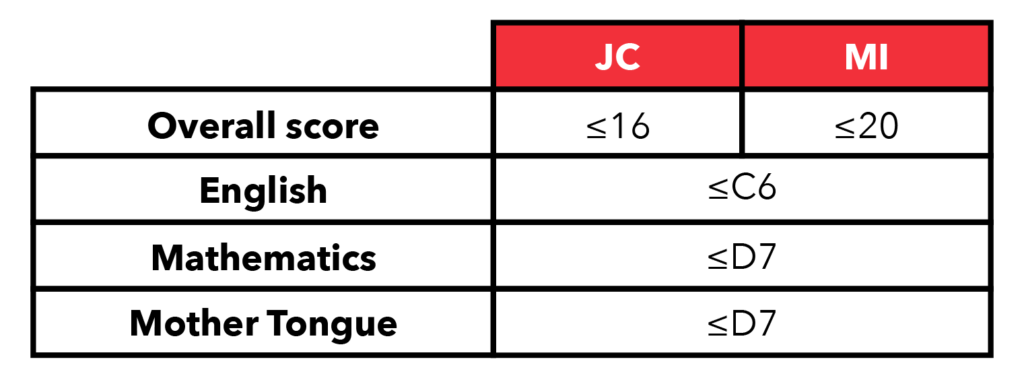
Subject requirements for JC and MI admission under the new L1R4 system, including specific grades required for English Language, Mathematics and Mother Tongue Language
Key Implications Of The New L1R4 System
Math, Science & Humanities: Greater Importance For Each Counted Subject
While Math, Science, and Humanities subjects are both mandatory under the L1R5 and L1R4 systems, the L1R5 system offered more room for students to buffer a weaker grade in a Math or Science subject with stronger performance in other areas, such as additional Humanities or Language subjects.
By taking one fewer subject into consideration, the new L1R4 system reduces this buffering capacity. This means students will need to focus more intensely on improving in all his/her subjects to maintain a competitive JC score, as each of the five counted subjects now carries a proportionally heavier weight.
Example: Olivia: Weak in Math/Science, Strong in Humanities
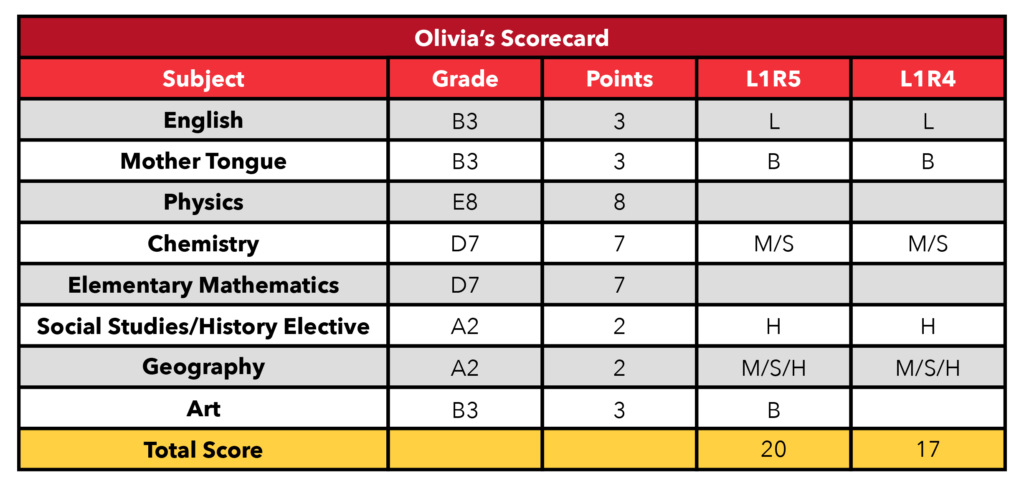
Example of how a student, Olivia, will perform under the existing L1R5 and new L1R4 systems
Under the L1R5 system, Olivia’s total JC score of 20 is achieved by counting her 6 best-performing relevant subjects:
- English (3)
- Mother Tongue (3)
- Chemistry (7)
- Social Studies/History Elective (2)
- Geography (2)
- Art (3)
Despite her low grades in Chemistry and Math, she still qualifies for JC consideration with 20 points because of Art, her additional best-performing subject, which counted as a buffer.
Under the L1R4 system, only these five subjects are counted:
- English (3)
- Mother Tongue (3)
- Chemistry (7)
- Social Studies/History Elective (2)
- Geography (2)
The exclusion of Art removes one of her stronger subjects, and the weak grade in Chemistry now carries more weight, leading to a total JC score of 17, which is just above the JC cut-off score of 16. This means that there’s less leeway to offset weak subjects under the L1R4 system, making each grade more critical.
Fewer Bonus Points to Buffer Mistakes
Bonus points from CCA, Higher Mother Tongue or selected subjects are now capped at 3 (down from 4 previously). This gives students a smaller buffer when applying to JCs, and makes each counted subject even more crucial to securing a competitive JC score.
Exception: Students taking Language Elective Programmes (LEP) may be eligible for an additional 2 bonus points.
L1R5 vs L1R4: What’s The Difference?
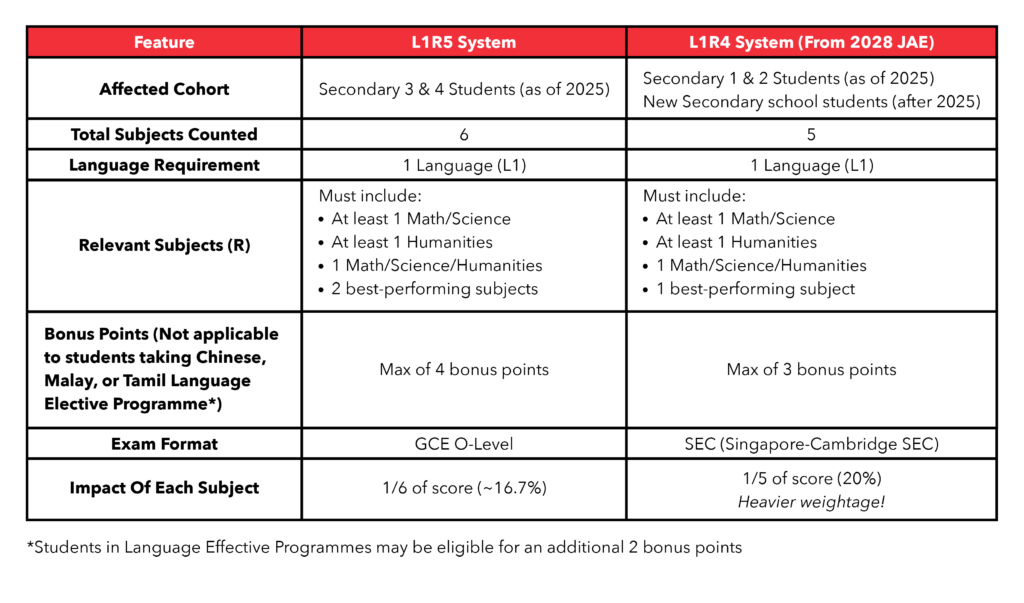
Differences between the L1R5 and L1R4 JC scoring systems including who’s affected, what subjects are counted and what is the maximum bonus points
Will My Child Be Affected By The New L1R4 Change If She/He Intends To Apply For Polytechnics Instead?
If your child plans to apply to a Polytechnic, the admission criteria operate under a different system and are not directly affected by the L1R4 change for JC.
Polytechnic admissions use a distinct scoring system called ELR2B2, which is based on your child’s O-Level or SEC results.
Here’s a quick overview of ELR2B2:
- EL: English Language (compulsory)
- R2: Two relevant subjects related to the intended course (e.g., Mathematics, Science, or Humanities, depending on the course requirements)
- B2: Two best other subjects (from the remaining O-Level/SEC subjects)
In total, five subjects contribute to the ELR2B2 aggregate score, which determines Polytechnic course eligibility. The subjects considered relevant vary by polytechnic course, and a lower ELR2B2 score means better chances of admission.
Important Changes to ELR2B2 from 2028 Intake
For students applying to Polytechnic Diploma Year 1 from the 2028 intake onwards, they will now be permitted to include one G2 subject (equivalent to Normal (Academic) level) in their ELR2B2 score, specifically within the B2 (two best other subjects) component. The remaining four subjects must continue to be based on G3 subjects to ensure that students can cope with the academic rigour in the polytechnics.
Consequently, the net aggregate cut-off scores for Polytechnic admission will be adjusted to reflect this change:
- For general polytechnic courses, the cut-off will shift from 26 to 22 points.
- For Nursing courses, it will adjust from 28 to 24 points.
Here’s How You Can Help Your Child Succeed In Secondary School
While the new L1R4 system encourages more holistic development, building a strong academic foundation remains crucial, especially in core subjects like Math and Science.
As your child takes more ownership over his/her studies, here are 3 key areas of growth that you can encourage him/her to work towards:
- Strengthen Core Concepts: Your child should have a thorough understanding of the key concepts from each Math and Science topic, which form the foundation for tackling tougher questions and other topics he/she will learn subsequently.
- Focus on Common Mistake Areas: He/she should not just understand the concepts, but also how these concepts are tested in different question types. By identifying which question types he/she finds most challenging, he/she can plan for his/her revision more effectively by focusing on these weaker areas. At The Pique Lab, the worksheets our students practise with are strategically sorted by sub-topics to help them recognise their weaker question types and build confidence through focused practice.
- Practise Exam-style Questions: Familiarity with common exam question styles can greatly reduce your child’s exam anxiety. At The Pique Lab, past-year question types are consistently woven into our learning materials to help our students build exam question exposure and readiness from Day 1.
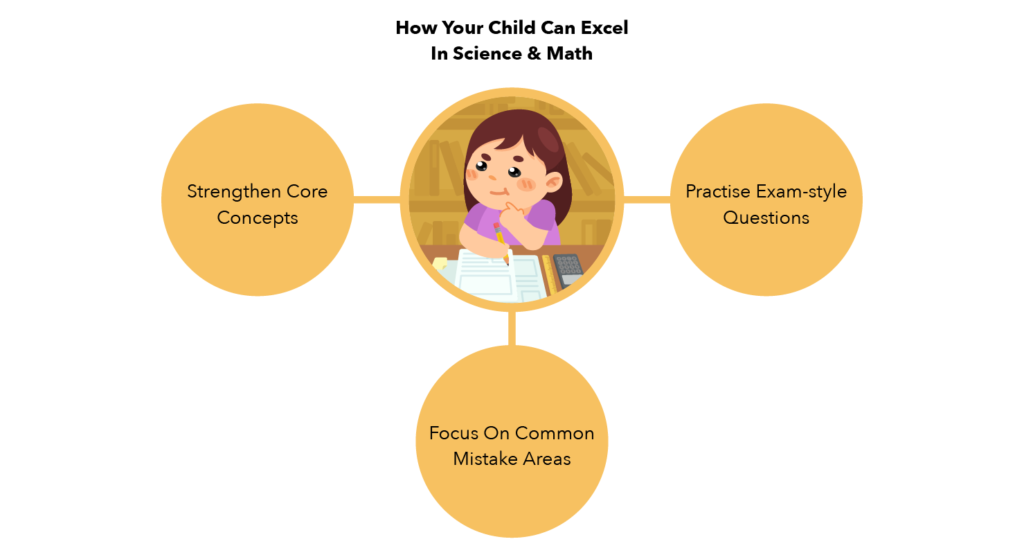
3 ways your child can excel in Science and Math in secondary school
What Students in Secondary 1 to 4 (2025 Cohort) Should Focus On
Secondary 1 (2025)
- This is the perfect time to start building strong foundations in core Math and Science topics such as Density, Mass, Volume (Physics) and Separation Techniques (Chemistry).
- Build good study habits while adjusting to the new rigour of secondary school life, which includes increased CCA and social commitments.
Secondary 2 (2025)
- The first cohort to sit for the new SEC exams in 2027 and apply to JC using the L1R4 system in 2028.
- Emphasise understanding key concepts deeply and begin practising more exam-style questions to get familiar with the exam format.
- Identify what the more challenging topics are in Science and Math, and work on weaker areas to maximise his/her grades and secure his/her ideal subject combination.
Secondary 3 (2025)
- The last cohort preparing for O-Level exams in 2026 under the existing L1R5 system.
- Focus on consolidating knowledge and exam skills, especially in Math and Science subjects such as Additional Mathematics and Chemistry.
- Use past O-Level papers and past-year school examination papers to increase question exposure.
Secondary 4 (2025)
- The second last cohort preparing for O-Level exams in 2026 under the existing L1R5 system.
- Double down on exam preparation (Every mark is crucial to maximise your child’s L1R5 JC score!).
- Use past O-Level papers and past-year school examination papers to increase question exposure, time management and accuracy.
- Target weaker areas in Math and Science subjects, such as Additional Mathematics and Chemistry, with focused practice and revision.
How The Pique Lab Can Support Your Child’s Journey In Secondary School
Strengthening your child’s Math and Science foundation takes consistent effort and the right guidance.
Depending on your child’s learning needs and schedule, your child can look forward to growing in these areas in our Math and Science weekly classes and targeted school holiday programmes (March, June & September):
- Deepening understanding of core concepts using our coloured and concise coloured notes outlining what he/she needs to know for each topic
- Addressing common mistake areas with focused practice using thoughtfully curated questions (including question types your child must master!)
- Building confidence through exam-style question exposure woven into our topical notes, in-class exercises, homework, topical tests and more
Conclusion
We hope that this article has provided you with a clearer understanding of how the new L1R4 system works and what your secondary school child should prioritise, depending on which academic level he/she is at.
While the new L1R4 system is designed to free up more of your child’s time to pursue other interests and develop himself/herself holistically, it’s also important that he/she doesn’t neglect his/her subjects such as Science and Math to ensure a competitive JC score.

If you like our methodology, we’ve some ongoing weekly Science and Math classes:
S1 Science Grade Accelerator Programme
S1 Math Grade Accelerator Programme
S2 Science Grade Accelerator Programme
S2 Math Grade Accelerator Programme
S3 Chemistry Grade Accelerator Programme
S3 A-Math Grade Accelerator Programme
S4 Chemistry Grade Accelerator Programme
S4 A-Math Grade Accelerator Programme

